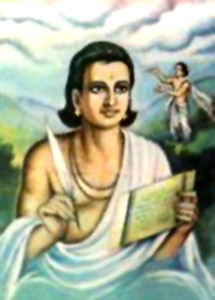Kalidasa is just not famous as a playwrit. In addition to the three legendary plays Kalidasa wrote, he is also a writer of two long epic poems, the Kumarasambhava (Birth of Kumara) and the Raghuvansa (Dynasty of Raghu). The former is concerned with the events that lead to the marriage of the god Shiva and Parvati, daughter of Himalaya. This union was wished by the gods for the creation of a son, Kumara, god of war, who would assist them vanquish the demon Taraka. The gods persuade Kama, god of love, to discharge an amatory arrow at Shiva who is engrossed in meditation. Infuriated by this unwanted disruption of his austerities, he burns Kama to ashes with a glance of his third eye. But love for Parvati has already been aroused and it culminates into their marriage.

The Raghuvansa speaks about the family to which the great hero Rama belonged, setting out with the earliest ancestors and capsuling the principal events told in Ramayana by Valmiki. But like the Kumarasambhava, the last nine cantos of which are distinctly additions of another poet, the Raghuvansa ends rather hurriedly, hinting either that it was left unfinished by the poet, or that its concluding portion was lost early.
Finally, included in the other prestigious list of Kalidasa`s poems, there are two lyric poems, the Meghaduta (Cloud Messenger) and the Ritusamhara (Description of the Seasons). The latter, can safely be considered as a youthful composition, as it is recognised by somewhat hyperbolised and overly high-spirited depictions of nature, such as are not elsewhere emblematic of the poet. It is of further interest that the Ritusamhara, published in Bengal in 1792, was the first book to be printed in Sanskrit.
The Meghaduta is smaller in extent compared to Ritusamahara; the first of the Purvamegha comprises 66 stanzas and the second half or Uttaramegha consists of 55 stanzas. It is a marvellous poem by Kalidasa, describing the message of a departing Yaksha to his wife, to be conveyed through a cloud. Yaksha, servant to lord Kubera, made some mistake in his duty; Kubera consequently punished him with a curse, banishing him from Alaka into exile for a period of one year. Hence, Yaksha sent his message to his wife through a cloud.













